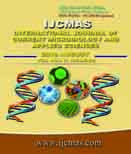


 National Academy of Agricultural Sciences (NAAS)
National Academy of Agricultural Sciences (NAAS)

|
PRINT ISSN : 2319-7692
Online ISSN : 2319-7706 Issues : 12 per year Publisher : Excellent Publishers Email : editorijcmas@gmail.com / submit@ijcmas.com Editor-in-chief: Dr.M.Prakash Index Copernicus ICV 2018: 95.39 NAAS RATING 2020: 5.38 |
This study investigated the anti-diabetic effect of ethanolic bark extract of Khaya senegalensis in Alloxan-induced diabetic albino Wistar rats. Sixty (60) female albino rats were randomly placed into six (6) study groups of ten (10) animals designated as; non-diabetic control (NDC), diabetic control (DC), and diabetic extract treated groups (DSB1, DSB2, and DSB3) receiving varying extract concentration of 100mg/kg, 200mg/kg, and 400mg/kg body weight respectively. Animals were sacrificed after 28 days of treatment and blood was obtained for biochemical analysis. Body weight indices obtained from this study revealed a decrease (p<0.05) in body weight in the extract treated group when compared with non-diabetic control with an attendant increase (p<0.05) when compared with diabetic control. Phytochemical screening detected biologically important metabolites including phenolics and steroids while haematological parameters such as packed cell volume and haemoglobin decreased in the extract treated group when compared with the non-diabetic control but significantly increased (p<0.05) when compared with diabetic control. Lipid profile showed a significant decrease (p<0.05) in total cholesterol and low density lipoprotein (LDL) in the extract treated group with an attendant increase when compared to the diabetic control and non-diabetic control respectively. Serum liver enzymes; alkaline phosphatase (ALP) and alanine transaminase (ALT) were increased in the extract treated group when compared to the non-diabetic control but a significant decrease (p<0.05) was observed in comparison with the diabetic control. In conclusion, data generated from this study show that ethanolic bark extract of Khaya senegalensis possesses antihyperglycaemic activities in alloxan induced diabetic rats.
 |
 |
 |
 |
 |